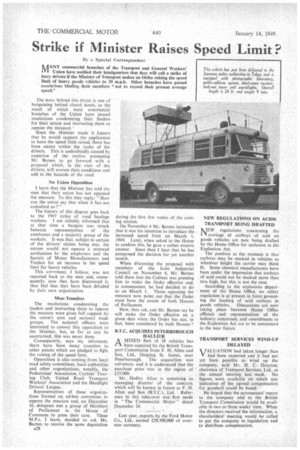Strike if Minister Raises Speed Limit ?
Page 30

If you've noticed an error in this article please click here to report it so we can fix it.
By is Special Correspondent MANY commercial branches of the Transport and General Workers' Union have notified their headquarters that they will call a strike of lorry drivers if the Minister of Transport makes an Order raising the speed limit of heavy goods vehicles to 30 m.p.h. Other branches have passed resolutions binding their members "not to exceed their present average speed."
The story behind this threat is one of bargaining behind closed doors, as the result of which most commercial branches of the Union have passed resolutions condemning their leaders for their action and instructing them to oppose the measure.
Since the Minister made it known that he would support the application to have the speed limit raised, there has been unrest within the ranks of the drivers. This is undoubtedly Caused by suspicion of the motive prompting Mr. Barnes to go forward with a proposal which, in the view of the drivers, will worsen their conditions and add to the hazards of the road.
No Union Opposition
I learn that the Minister has told the men that their union has not opposed the measure. To this they reply: "How can the union say that when it has not consulted us ?"
The history of this dispute goes back to the 1947 strike of road haulage workers. I am reliably informed that at that time a bargain was struck between representatives of the emnloyers and a majority group of the workers. It was that, subject to certain of the drivers' claims being met, the unions would not oppose a renewed apnlication by the employers and the Society of Motor Manufacturers and Traders for an increase in the speed limit for heavy vehicles.
This agreement. I believe, was not reported back to the men and, consequently, now they have discovered it, they feel that they have been deluded by their own organization.
Mass Transfers The resolutions condemning the leaders and instructing them to oppose the measure were given full support by the union's area and national trade groups. The national officers were instructed to convey this opposition to the MiniSter, but, so far as can be ascertained, this was never done.
ConseqUently, says my informant. there have been many transfers to other unions which are pledged to fight the raising of the speed limit.
Opposition is also coming from local road safety committees, local authorities and other organizations, notably, the Pedestrians' Association, Cyclists' Touring Club, United Road Transport Workers' Association and the Headlight Drivers' League.
Representatives of these organizations formed an, ad-hoc committee to oppose the measure and. on December 16, delegates met a group of Members of Parliament in the House of Commons to press their case. These M.P.s. I learn, decided to ask Mr. Barnes to receive the same deputation A28 during the first few weeks of the coming session.
On November 4 Mr. Barnes intimated that it was his intention to introduce the increased speed limit on March 1, 1949. Later, when asked in the House to confirm this, he gave a rather evasive answer. Since then I hear that he has postponed the decision • for yet another month.
When discussing the proposal with members of the Joint Industrial Council on November 4, Mr. Barnes told them that the Cabinet was pressing him to make the Order effective and, in consequence, he had decided to do so on March 1. Those opposing the measure now point out that the Order must have the assent of both Houses, of Parliament.
How, they ask, can Mr. Barnes say he will make the Order effective on a given date when the Order has not, in fact, been considered by both Houses ?
B.T.C. ACQUIRES PETERBOROUGH HAULIER
rtA MIXED fleet of 18 vehicles has been acquired by the British Transport Commission from F. H. Allen and Son. Ltd., Deeping St. James, near Peterborough. The acquisition was voluntary. and it is understood that the purchase price was in the region of £35.000.
Mr. Hedley Allen is remaining as managing director of the concern, which will be known in future as F. H. Allen and Son (B.T.C.), Ltd. Reference to this take-over was first made in "The Commercial Motor" dated December 24 Last year, exports by the Ford Motor Co., Ltd., earned £28,500,000 of overseas currency. NEW REGULATIONS ON ACIDS TRANSPORT BEING DRAFTED
NEW regulations concerning the carriage of carboys of acid on goods vehicles are now being drafted by the Home Office for inclusion in the Explosives Act.
The position at the moment is that carboys may be stacked in vehicles to whatever height the carrier may think fit. Some chemical manufacturers have been under the impression that carboys of acid could not be stacked more than two high, but this is not the case.
According to the explosives department of the Home Office, no safety regulation is at present in force governing the loading of acid carboys in goods vehicles. Discussions are now taking place between Home Office officials and representatives of the industry concerned, and amendments to the Explosives Act are to be announced in the near future.
TRANSPORT SERVICES WIND-UP DELAYED
VALUATION had taken longer than had been expected and it had not yet been possible to wind up the company, said Mr. H. C.. Drayton, chairman of Transport Services, Ltd., at the annual meeting last week. No figures were available on which any indication of the agreed compensation for goodwill could be based.
He hoped that the accountants' report to the company and to the BritishTransport Commission would be available in two or three weeks' time. When the directors received the information, a shareholders' meeting would be called to put the company in liquidation and to distribute compensation.




























































































